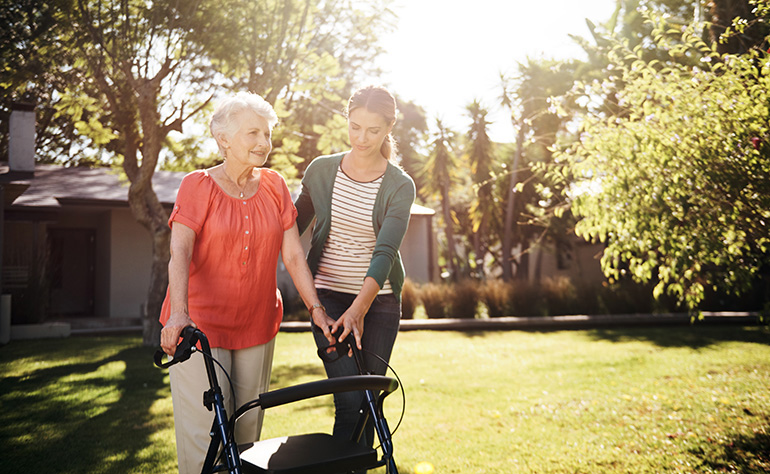Caregiving During the COVID-19 Pandemic
| COVID-19

April 7, 2020, is National Caregiver Day.
One in four Canadians is a caregiver, meaning that they take on “an unpaid caring role for someone who needs help because of a physical or cognitive condition, an injury or a chronic life-limiting illness,” as described by Carers Canada.
Caregiving is a challenging role at the best of times. Most caregivers juggle caregiving with work and family responsibilities. Anxiety, stress and burnout are common. In recent weeks, the COVID-19 pandemic has added to the strain, with caregivers trying to balance their loved one’s needs with the demands of social distancing. In addition, many of the resources that caregivers and their loved ones depend on – such as support groups, seniors’ programs and other activities – have been put on hold as communities grapple with the coronavirus.
As we noted in our previous post about COVID-19, certain people are at greater risk of becoming infected and developing severe illness:
- People aged 65 and older
- People with a compromised immune system
- People with an underlying medical condition
Adult children who usually care for an aging parent at home or provide support to a parent who is in a retirement home, long-term-care facility or hospital are now afraid of exposing their parent to the coronavirus. Many nursing homes across Canada have banned visits in order to protect vulnerable seniors.
Pandemic planning
Having a plan in place during the COVID-19 crisis will ease your mind and, in case you become ill yourself, ensure that your loved one is cared for. Here are some ideas to consider:
- Create a care network. Talk to family members, friends and trusted neighbours who could provide support to your loved one in case you’re unavailable. Prepare detailed written instructions, including contact information for your loved one’s health-care professionals, and be sure that everyone is aware of social distancing guidelines. For example, when delivering groceries to seniors, many families are taking a “contactless” approach and leaving food at the door. You could also consider paying for a food delivery service.
- Prepare for an emergency. We’ve written about disaster preparedness in the past. Here’s a quick summary: Create a 72-hour survival kit, including non-perishable food, water, medication and other necessities. Create an action plan with your loved one’s support network. Write down medical information, including health care providers, medications, family history, vaccinations, blood type and more. Make a plan for what to do with pets, should your loved one become ill.
- Access community resources, including support agencies. For example, local branches of the Alzheimer Society offer phone and email support to people living with dementia and their caregivers, and ALS Canada is offering remote visits via phone or email for Ontarians living with ALS. If you’re concerned about a loved one who lives alone, but you can’t visit because you’re self-isolating or quarantined, consider professional home care services.
- Stay connected. Even if you and your loved one can’t see each other in person, it’s important to maintain contact. Read our ideas for staying connected during the pandemic, including ways that kids can stay in touch with their grandparents.
- Find out your loved one’s wishes for their health and property. This is important in case you need to make decisions on their behalf. Learn about advance directives, powers of attorney and wills in our article “Making Your Wishes Known.”
- Make time for self-care. While this might seem like an indulgence, self-care essential for a caregiver’s well-being. For ideas, read our post about self-care, and remember to take breaks from reading and listening to COVID-19 news and social media.
Stay informed
The risk of COVID-19 is Canada is now considered high. This does not mean that everyone will get the disease, but our health-care system is already experiencing a significant impact. For current COVID-19 information, visit these websites:
Coronavirus disease (COVID-19) (Government of Canada)
Coronavirus disease (COVID-19): Outbreak update (Government of Canada)
Bayshore Home Health offers a wide range of home care services to help Canadians live independently for as long as possible. Contact us at 1-877-289-3997 for details.
